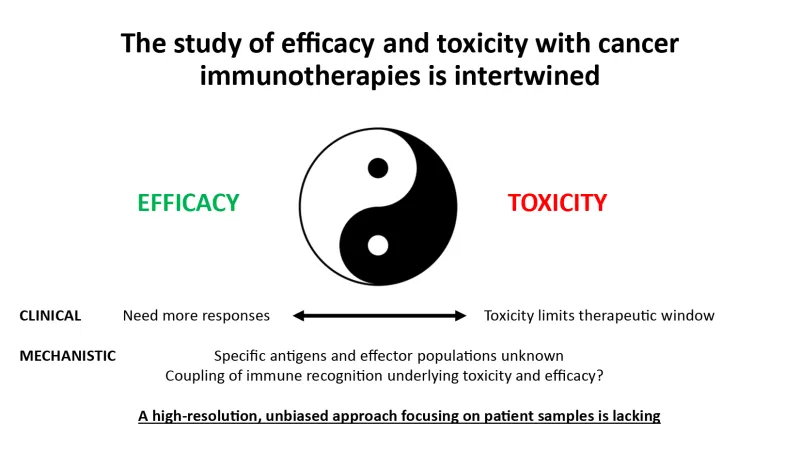Cancer immunotherapy, or approaches that mobilize patients' immune systems to recognize and eliminate their tumors, have revolutionized the way we treat cancer. However, the therapeutic window for immunotherapy has been limited both by the limited number of patients who respond, as well as by autoimmune side effects (immune-related adverse events, or IRAEs) caused by these treatments.
Research in the Oh Laboratory uses translational approaches to probe how the adaptive immune response interacts with cancer to lead to both beneficial and harmful outcomes after cancer immunotherapy, specifically tumor control and IRAEs. We are also interested in understanding how anti-tumor and IRAE immune responses after immunotherapy may be related to each other.
We use multifaceted approaches to identify novel immune effector populations in samples from immunotherapy-treated patients, including next-generation sequencing (T cell receptor sequencing, single-cell RNA sequencing and proteomics), cytometry (flow and mass cytometry), and high-dimensional tissue imaging. We then test the functional relevance of these populations using ex vivo immune assays as well as genetically engineered murine models. The goal of this work is to discover and validate immune effector populations in cancer patients, and novel therapeutic approaches targeted to these populations.
We have recently identified an effector population of cytotoxic CD4+ T cells which are found in tumors from bladder cancer patients, express cytolytic molecules, and can directly kill autologous tumor (Oh DY et al. Cell 2020). We are further exploring the mechanisms that specifically regulate the activity of these cells, and therapeutic approaches that may modulate this class of effectors. We are also investigating the composition and function of clonally expanded T cell populations in autoimmune colitis that occurs after checkpoint inhibition, and how these cells contribute to colitis pathogenesis. Our work is highly collaborative in nature and involves frequent interactions with immunologists, clinicians, and computational biologists within the UCSF Helen Diller Family Comprehensive Cancer Center
